Whether you’re a coach seeking to enhance your practice, a leader looking to inspire your team, or just an individual striving for personal growth, the curated coaching questions below should provide you with a roadmap to driving sustainable change and achieving success. From clarifying goals to overcoming obstacles, each prompt is crafted to ignite introspection, spark meaningful conversations, and propel you toward your desired outcomes. Let’s dive in and be ready to unlock the potential within!
(by Jonathan M. Pham)
What Are Coaching Questions?
Coaching questions are specific inquiries designed to prompt self-reflection and spark new ideas in the coachee. Unlike ordinary questions that often revolve around seeking/ demanding information, these special prompts aim to:
- Elicit awareness: Thought-provoking questions provide the coachee with the necessary push to explore their current situation, challenges, and strengths.
- Drive self-discovery: Through the coach’s guidance, coachees may gain a deeper understanding of their motivations, values, and limiting beliefs.
- Empower action: Last but not least, these questions enable individuals to better identify solutions, set goals, and develop strategies to visualize them.
Why Should We Ask Coaching Questions?
- Promotes self-discovery: Coaching questions aren’t meant to provide answers; rather, they act as a catalyst for those involved to delve deeper into their own thoughts, feelings, and motivations. By reflecting on these inquiries, one becomes better aware of their strengths, weaknesses, values, as well as potential roadblocks hindering their progress.
- Empowers ownership: Instead of simply giving advice, asking coaching questions encourages people to actively participate in finding solutions. This fosters a sense of ownership and accountability, as the individual arrives at their own conclusions and strategies through the exploration prompted by the questions.
- Boosts critical thinking: Effective questions challenge the coachee to think critically about their situation, analyze various aspects, and consider different perspectives. This mental exercise helps strengthen their problem-solving skills and equips them to approach future obstacles with a more analytical mindset.
- Uncovers hidden potential: Coaching questions make it easier to unearth areas where one might possess untapped potential or unrecognized limiting beliefs. By prompting self-reflection and exploration, these inquiries can lead to breakthroughs and a shift in perspective, allowing people to realize their capabilities in a new light.
- Drives action and goal-setting: Through the process of self-discovery and critical thinking elicited by such questions, the coachee is better equipped to set realistic objectives, identify the steps needed to take action, and develop a specific action plan to move forward.

Types of Coaching Questions
Open-ended
Purpose: Encourage exploration and elaboration.
Examples:
- “What are your thoughts on…?”
- “How do you see this situation playing out?”
Closed-ended
Purpose: Gather specific information or confirm understanding.
Examples:
- “Do you have any questions?”
- “On a scale of 1 to 10, how confident are you feeling?”
Powerful language
Purpose: Stimulate critical thinking and self-reflection.
Examples:
- “How could you approach this from a different perspective?”
- “What limiting beliefs might be holding you back?”
Reflective
Purpose: Encourage the coachee to review and learn from their experiences.
Examples:
- “What did you learn from this situation?”
- “How did your actions contribute to the outcome?”
Big picture
Purpose: Help the coachee broaden their perspective and consider the long-term.
Examples:
- “What are your long-term goals?”
- “How will achieving this goal impact your life?”
Specific
Purpose: Pinpoint details and develop concrete action steps.
Examples:
- “What specific steps can you take to move forward?”
- “Who can you reach out to for support?”
Probing
Purpose: Gain deeper insights and clarify vague statements.
Examples:
- “Can you elaborate on that?”
- “What do you mean by…?”
Challenge
Purpose: Encourage the coachee to reconsider their assumptions and explore alternative possibilities.
Examples:
- “Have you considered…?”
- “What if you looked at this from another angle?”
Hypothetical
Purpose: Spark creative thinking and explore potential solutions.
Examples:
- “What would happen if…?”
- “If you could achieve anything, what would it be?”
Solution-Focused
Purpose: Shift the focus from problems to finding solutions and taking action.
Examples:
- “What steps can you take to overcome this obstacle?”
- “How can you utilize your strengths to achieve your goals?”
What Makes Good Coaching Questions?
1. Open-Ended:
- Structure: Avoid questions with “yes” or “no” answers.
- Purpose: Prompt elaboration and encourage the coachee to delve deeper into their thoughts and experiences.
Example: Instead of “Did you achieve your goal?”, ask “What factors contributed to your progress towards your goal?”
2. Powerful Language:
- Wording: Utilize words that stimulate critical thinking and self-reflection.
- Focus: Words like “how,” “what,” “why,” and “could” encourage exploration of possibilities and solutions.
Example: Instead of “There must be a reason this isn’t working,” ask “How can you approach this situation from a different perspective?”
3. Client-Centered:
- Tailored: Questions should be relevant to the coachee’s specific situation, goals, and challenges.
- Focus: Shift the emphasis from the coach’s solutions to the coachee’s own insights and resources.
Example: Instead of suggesting solutions, ask “What resources do you have available to overcome this obstacle?”
4. Forward-Looking:
- Orientation: Guide the coachee towards desired outcomes and future possibilities.
- Purpose: Shift the focus from dwelling on problems to exploring solutions and taking action.
Example: Instead of “What went wrong?”, ask “What steps can you take to move forward?”
Read more: 8 Effective Coaching Skills for Leaders & Managers

Coaching Questions by Model/ Framework
GROW Model
This popular framework focuses on helping individuals achieve their goals. It stands for Goal (establish the desired outcome), Reality (understand the current situation), Options (explore possible solutions), and Will (develop a plan to take action).
- What are your Goals in this situation?
- What is the current Reality of the situation?
- What Options do you have to move forward?
- What Will you do next?
- How will you know when you’ve succeeded?
CLEAR Model
With this model, the emphasis is on setting clear expectations throughout the coaching process. Contracting involves establishing goals and ground rules, Listening allows the coach to understand the client’s perspective, Exploring helps the client discover solutions, Action focuses on creating a plan for moving forward, and Review allows for ongoing assessment and adjustments.
- What is the Current reality of the situation?
- What is the Lifestyle you desire?
- What are the Emotions you are feeling?
- What Actions will you take?
- What are the Results you seek?
OSKAR Model
A solution-oriented model with a focus on leveraging a client’s strengths. Its key components include Objectives (setting goals), Situations (exploring the current situation), Knowledge and skills (identifying relevant resources), Actions (developing an action plan), and Results (reviewing progress and making adjustments).
- What is going well right now?
- What is your best Outcome in this situation?
- What Solutions have you already tried?
- What are your next small Steps?
- How can I (the coach) support you in reaching your goals?
Read more: The Situational Coaching Model (SCM) by Dr. Peter Chee
Coaching Questions for Leaders & Managers to Ask Employees
Reality assessment
- How do you perceive your current role within the team/company?
- What challenges are you facing in your current tasks/projects?
- How do you feel about your workload and responsibilities?
- Can you identify any patterns or trends in your performance?
- What resources do you need to improve your effectiveness?
Goal setting
- What specific goals do you have for your professional development?
- How do these goals align with the team/company objectives?
- What steps are necessary to achieve these goals?
- How will you measure progress towards your goals?
- What support do you need from me or others to achieve these goals?
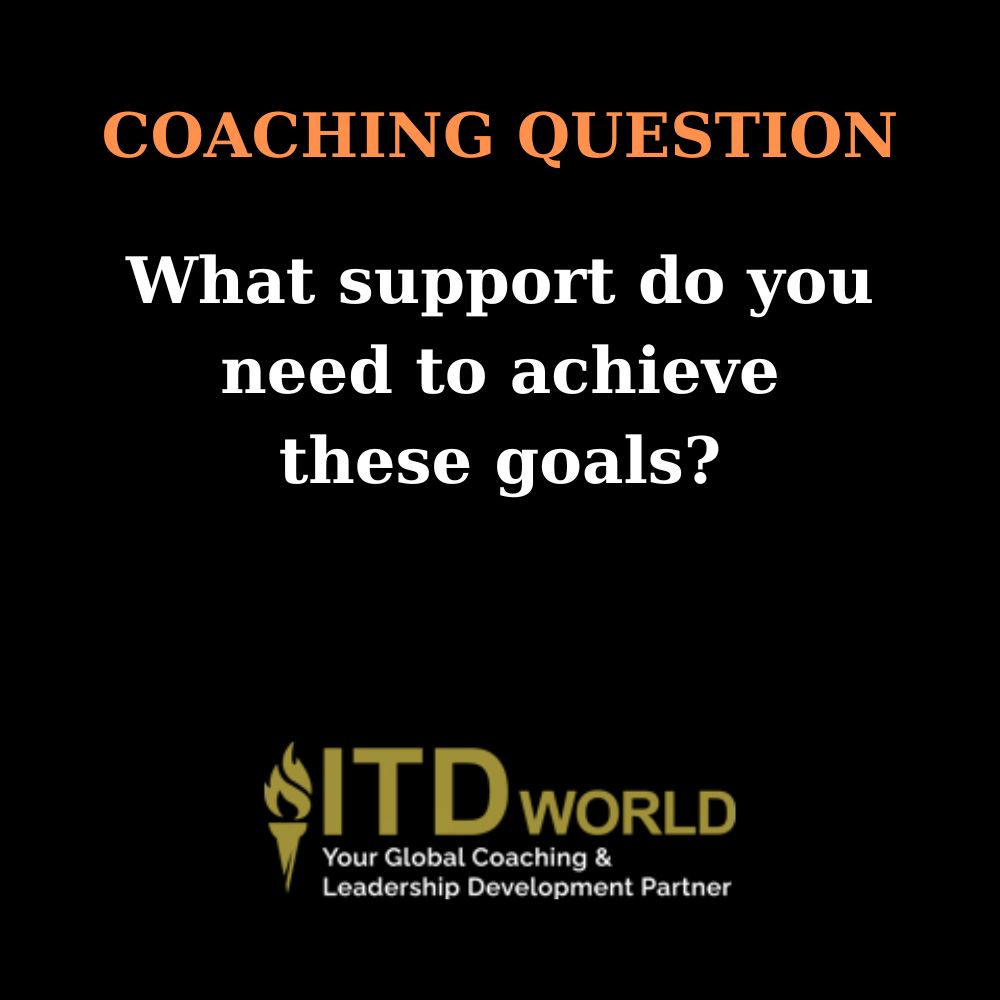
Coaching questions for goal-setting
Action planning
- What specific actions will you take to progress towards your goals?
- How will you prioritize these actions?
- Are there any potential obstacles or challenges you anticipate?
- How will you adapt your plan if circumstances change?
- How can I help hold you accountable for following through on your plan?
Critical thinking
- How do you approach problem-solving in your work?
- Can you think of a recent situation where you had to think critically?
- What factors do you consider when evaluating different options?
- How do you ensure that your decisions are well-informed and rational?
- How open are you to feedback and alternative perspectives?
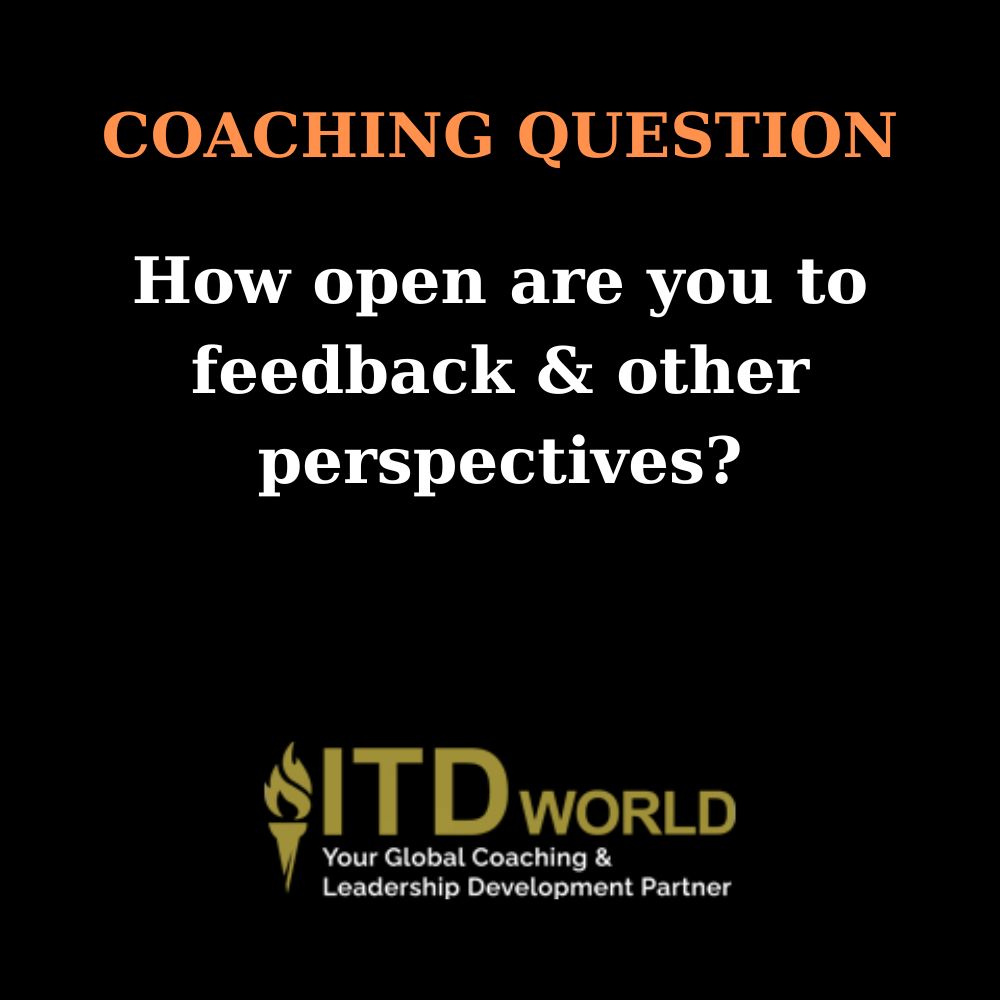
Coaching questions to promote critical thinking
Career aspirations
- Where do you see yourself in your career in the next 3-5 years?
- What steps are you taking to work towards your long-term career goals?
- How do your current responsibilities align with your career aspirations?
- Are there any specific skills or experiences you want to gain to further your career?
- How can I support you in achieving your career aspirations?
Skill development
- What skills do you believe are most important for success in your role?
- In what areas do you feel you could improve your skills?
- What resources or training opportunities would help you develop these skills?
- How do you plan to integrate new skills into your daily work?
- How will you measure your progress in skill development?
Read more: Employee Skill Development – Strategies for Organizations to Boost the Bottom Line
Leadership
- How do you define effective leadership?
- What leadership qualities do you possess, and how do you demonstrate them?
- Can you think of a time when you had to lead a team or project?
- How do you handle conflicts or disagreements within your team?
- What steps are you taking to further develop your leadership abilities?
Resilience & Motivation
- How do you typically respond to setbacks or challenges?
- What motivates you to perform at your best?
- Can you recall a time when you overcame a significant obstacle?
- How do you maintain your motivation during difficult times?
- What strategies do you use to bounce back from failure or disappointment?
Performance feedback
- How do you prefer to receive feedback on your performance?
- What specific aspects of your work do you feel are strengths?
- In what areas do you think you could improve?
- How do you incorporate feedback into your professional development?
- How can I provide you with constructive feedback to help you grow?
Read more: Giving Effective Feedback – A Practical Guide for Success
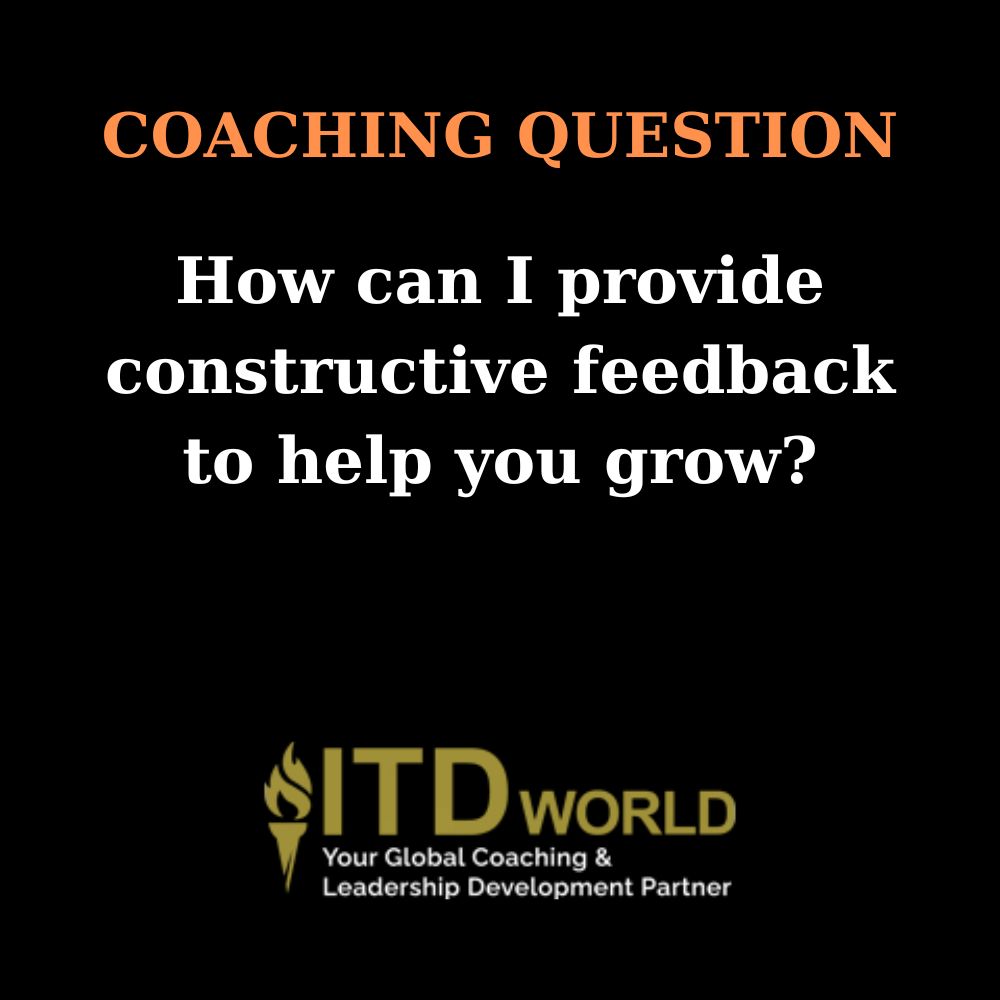
Coaching questions to ask your team
Read more: Team Coaching – Guidelines for Building High Performance Groups
Life Coaching Questions to Ask Clients for Every Situation
Kick-off & relationship-building
- What motivated you to seek coaching at this time?
- What are your expectations for our coaching relationship?
- Can you tell me a bit about your background and experiences?
- How do you prefer to communicate and collaborate during our sessions?
- What goals do you hope to achieve through coaching?
Warm-up questions
- How are you feeling today, both mentally and emotionally?
- What events or experiences have stood out to you since our last session?
- Is there anything specific on your mind that you’d like to discuss today?
- What progress have you made towards your goals since we last spoke?
- Are there any challenges or obstacles you’re currently facing?
Probing questions
- Can you tell me more about that?
- How do you think others perceive this situation?
- What underlying beliefs or assumptions might be influencing your thoughts?
- What do you think is the root cause of this challenge?
- How does this situation align with your values and priorities?
Questions to dig deeper
- What emotions are you experiencing right now?
- How does this situation connect with past experiences or patterns?
- Can you describe any recurring thoughts or feelings you’ve had about this issue?
- What do you believe is holding you back from making progress?
- How would you like to see this situation change in the future?
Questions to end sessions
- What insights or realizations have you gained from our discussion today?
- How do you plan to apply what we’ve discussed in your daily life?
- What actions will you take before our next session?
- Is there anything else you’d like to discuss or explore before we finish?
- How are you feeling now compared to when we started the session?
Follow up questions
- How did the actions you planned during our last session go?
- Did you encounter any obstacles or challenges when implementing those actions?
- What did you learn from those experiences?
- How do you feel about your progress towards your goals since our last session?
- Is there anything you’d like to adjust or change in your approach moving forward?
Read more: Why Follow Up is Crucial to Behavior Change & Leadership Effectiveness
Questions to help clients get unstuck
- What perspectives or options haven’t you considered yet?
- How might you approach this situation differently if you weren’t feeling stuck?
- Can you identify any underlying fears or limiting beliefs that might be holding you back?
- What small steps could you take to start moving forward?
- How can you leverage your strengths or past successes to overcome this challenge?
Questions to help visualize the future
- What does your ideal outcome look like in this situation?
- Can you imagine yourself achieving your goals?
- How would your life be different if you were able to overcome this challenge?
- What steps can you take to bring your vision of the future closer to reality?
- How do you feel when you picture yourself living the life you desire?
Strengths identification questions
- What are some of your greatest strengths and talents?
- How do you typically leverage these strengths in your daily life?
- Can you recall a time when one of your strengths helped you achieve success?
- How can you further develop and capitalize on your strengths?
- In what ways do your strengths contribute to your overall sense of well-being?
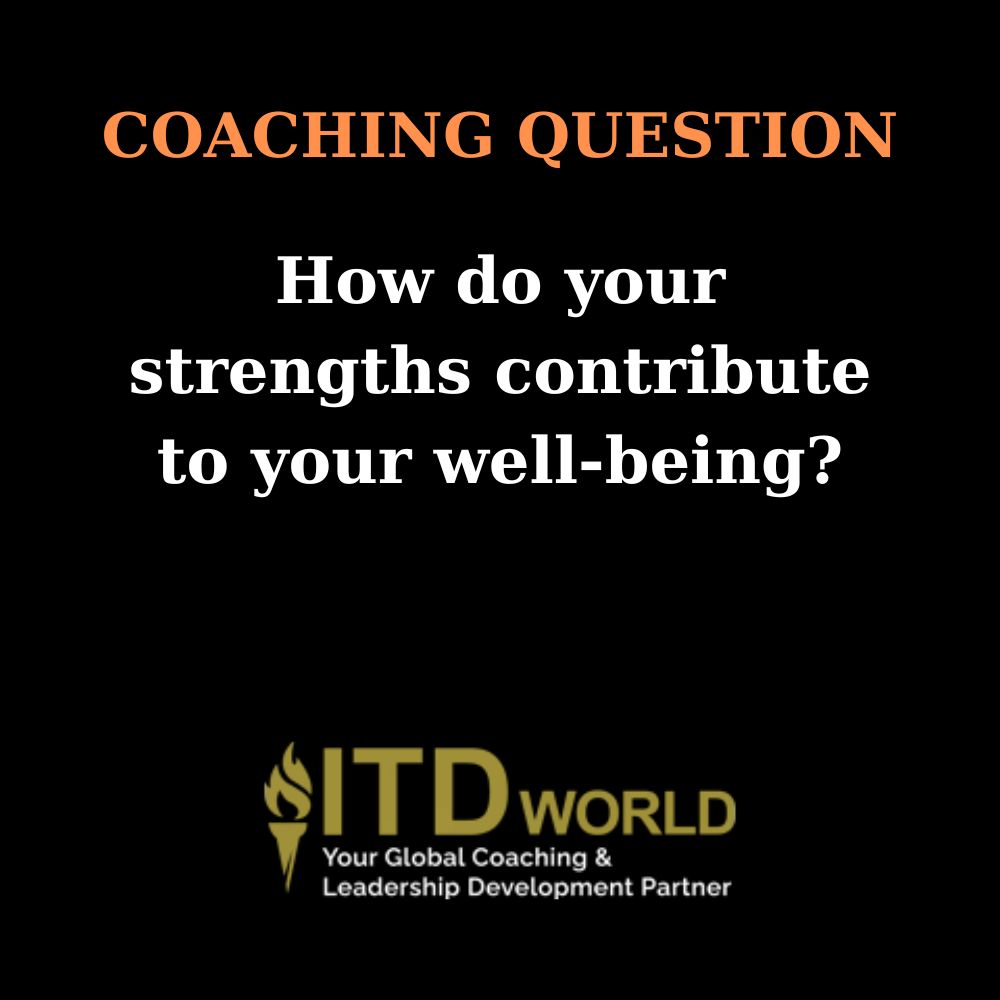
Coaching questions to ask coachees
Read more: Life Coaching – Key to Finding Purpose & Fulfillment in Life
Coaching Questions to Ask Yourself & Others – by Topic
Confidence
- What achievements or experiences have contributed to your confidence?
- How do you typically respond to situations that challenge your confidence?
- What beliefs or thoughts undermine your confidence, and are they based on reality?
- What steps can you take to build and maintain your confidence?
- How can you remind yourself of your capabilities and strengths when facing doubt?
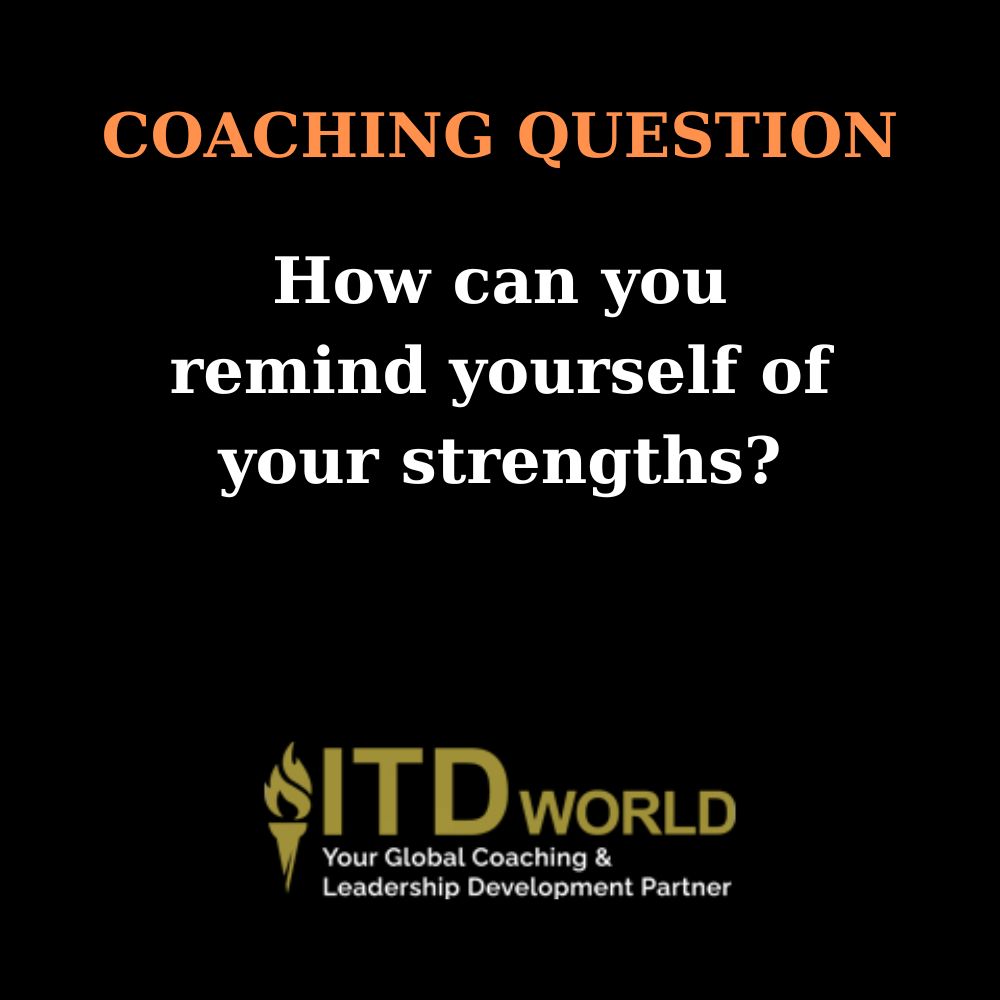
Coaching questions to build confidence
Emotional intelligence
- How do you recognize and manage your emotions in different situations?
- Can you identify any patterns or triggers in your emotional responses?
- How do your emotions influence your thoughts and behaviors?
- What strategies do you use to regulate your emotions when necessary?
- How can you further develop your emotional intelligence to enhance your relationships and decision-making?
Time management
- How do you currently prioritize your tasks and responsibilities?
- What obstacles or distractions commonly disrupt your productivity?
- Can you identify any time-wasting habits or behaviors?
- What strategies have you found effective for managing your time more efficiently?
- How can you create a schedule or routine that aligns with your goals and priorities?
Communication
- How do you express yourself effectively in various contexts?
- What barriers or challenges do you encounter when communicating with others?
- Can you think of a recent communication situation that didn’t go as planned?
- What communication skills do you want to improve or develop further?
- How can you adapt your communication style to better connect with different people?
Accountability
- How do you hold yourself accountable for your actions and decisions?
- What external factors or systems help reinforce your accountability?
- Can you identify any instances where you’ve avoided accountability in the past?
- What motivates you to follow through on your commitments?
- How can you create accountability structures or routines to support your goals?
Read more: 5Cs of Effective Accountability Partners
Change management
- How do you typically respond to change or uncertainty?
- Can you recall a significant change you’ve experienced in the past, and how did you adapt?
- What fears or concerns do you have about potential changes in your life or work?
- What strategies have you found helpful for navigating periods of transition?
- How can you cultivate a mindset that embraces change as an opportunity for growth?
Read more: Change Management – Best Practices for Leading Organizational Transformation
Problem-solving
- How do you approach problem-solving when faced with a challenge?
- Can you identify any biases or assumptions that might influence your problem-solving process?
- What resources or support do you typically seek out when tackling difficult problems?
- How do you evaluate potential solutions and make decisions?
- What lessons have you learned from past problem-solving experiences?
Self-awareness
- How well do you understand your own thoughts, feelings, and motivations?
- Can you identify any blind spots or areas where your self-awareness is limited?
- What practices or exercises help you deepen your self-awareness?
- How does increased self-awareness benefit your personal and professional life?
- What feedback have you received from others regarding your self-awareness?
Behavior
- What patterns or habits do you notice in your behavior?
- How do your actions align with your values and goals?
- Can you identify any behaviors that you’d like to change or improve?
- What triggers or situations tend to influence your behavior?
- How can you cultivate habits that support your desired outcomes?
Conflict resolution
- How do you typically approach conflicts or disagreements with others?
- Can you recall a recent conflict situation and how you handled it?
- What emotions or concerns arise for you when faced with conflict?
- What strategies have you found effective for resolving conflicts peacefully?
- How can you improve your ability to communicate and collaborate in conflict situations?
Work-life balance
- How satisfied are you with the balance between your work and personal life?
- Can you identify any areas where your work-life balance feels out of sync?
- What activities or commitments are most important to you outside of work?
- How do you recharge and rejuvenate outside of work hours?
- What changes can you make to better align your work and personal priorities?
Decision making
- How do you typically approach decision-making processes?
- Can you recall a recent decision you struggled with, and how did you ultimately decide?
- What factors do you consider when weighing different options?
- How do you balance logic and intuition in your decision-making?
- What strategies can you use to make decisions more efficiently and confidently?
Mental health
- How would you rate your overall mental well-being currently?
- Can you identify any sources of stress or anxiety in your life?
- What coping mechanisms or self-care practices do you rely on during challenging times?
- Are there any negative thought patterns or beliefs that impact your mental health?
- How can you prioritize your mental health and seek support when needed?
Read more: 6 Steps for Mental Health and Wellbeing
Business performance management
- How do you measure the success of your business or organization?
- Can you identify any areas of your business that are underperforming or could be improved?
- What strategies have you implemented to enhance business performance?
- How do you track and analyze key performance indicators (KPIs)?
- What steps can you take to adapt and thrive in an ever-changing business landscape?
Read more: Performance Coaching – How to Unlock People’s Greatness
How Do You Start a Coaching Conversation?
Initiating a coaching conversation effectively sets the stage for a productive and empowering experience for the coachee. Here’s a roadmap to guide you through the initial steps:
- Setting the stage
The first step is to establish a warm and welcoming atmosphere by greeting the coachee and expressing your enthusiasm for the session. Additionally, make sure to briefly discuss the session’s purpose, desired outcomes, and any ground rules for open communication.
- Opening inquiry
Start with a broad yet thought-provoking question to invite the coachee to share their current state and goals. For example:
“What brings you here today?”
“What would you like to focus on in this session?”
Listen attentively to the coachee’s responses, both verbal and non-verbal cues. After that, try to briefly paraphrase what you heard to demonstrate understanding and encourage further elaboration.
- Clarifying & Focusing
As needed, ask clarifying questions to gain a deeper understanding of the coachee’s situation and desired outcomes. For instance:
“Can you tell me more about that?”
“What specifically do you hope to achieve?”
- Transitioning
Once you have a good understanding of the coachee’s focus, use a transitional phrase to move into the coaching phase of the conversation.
Example: “Based on what you’ve shared, it seems like…”
Read more: 10 Characteristics of a Good Coach
Challenges of Asking Coaching Questions
Asking effective coaching questions presents several challenges that require mindful navigation from the coach. Here are some key obstacles to consider:
1. Leading Questions:
- Issue: These questions subtly steer the coachee towards a specific answer, potentially hindering their ability to explore their own thoughts and solutions.
Example: “Don’t you think taking a public speaking course would boost your confidence?” (Implies the coach already has the answer)
- Solution: Frame questions openly to encourage independent thinking.
Better Example: “What strategies could help you feel more confident when presenting in public?”
2. Closed-Ended Questions:
- Issue: These questions limit the coachee’s response to a “yes” or “no” answer, hindering in-depth exploration.
Example: “Are you feeling overwhelmed?” (Limits the conversation to a binary answer)
- Solution: Use open-ended questions that prompt elaboration and deeper reflection.
Better Example: “Can you describe what’s contributing to your feeling of overwhelm?”
3. Why Questions (used excessively):
- Issue: While “why” questions can be valuable in some contexts, overusing them can put the coachee on the defensive, especially when addressing sensitive topics.
Example: “Why haven’t you been able to meet your deadline?” (Can be perceived as accusatory)
- Solution: Focus on “how” and “what” questions to encourage exploration and solution-oriented thinking.
Better Examples:
“How can we approach this deadline in a manageable way?”
“What specific obstacles are hindering you from meeting this deadline?”
4. Lack of Active Listening:
Issue: Failing to truly listen to the coachee’s responses can lead to irrelevant or poorly formulated questions that don’t address their specific needs.
Solution: Practice active listening by paying close attention to both verbal and non-verbal cues. Reflect and paraphrase the coachee’s statements to demonstrate understanding.
5. Neglecting Frameworks:
Issue: Without a framework, questions might lack direction and fail to guide the coachee through a structured process of self-discovery and goal setting.
Solution: Utilize coaching models like GROW (Goal, Reality, Options, Will) or CLEAR (Clarify, Learn, Explore, Apply, Reflect) to provide a structure for crafting effective questions.
6. Personal Biases:
Issue: The coach’s unconscious biases can influence the way they ask questions, potentially limiting the coachee’s perspective.
Solution: Be mindful of personal biases and strive to ask neutral questions that encourage the coachee to explore their own unique experiences and solutions.
7. Ignoring Emotional Undercurrents:
Issue: Focusing solely on the surface level of the conversation can miss crucial underlying emotions that might be hindering the coachee’s progress.
Solution: Acknowledge the coachee’s emotions and ask open-ended questions to help them explore and process their feelings.
8. Solution-Giving Instead of Solution-Finding:
Issue: Providing solutions directly can disempower the coachee and hinder their ability to develop their own problem-solving skills.
Solution: Ask questions that encourage the coachee to explore their own solutions and resources.

Principles of asking coaching questions
How to Make the Most Out of Coaching Questions
For those on the other side of the conversation, here are some key strategies to maximize your benefit from coaching questions:
Active Participation:
- Don’t just answer: View the questions as prompts for self-discovery and engage actively in the conversation.
- Elaborate: Go beyond one-word answers. Provide details, examples, and stories to illustrate your points and thought processes.
Deep Reflection:
- Look within: Use the questions as a springboard to delve deeper into your thoughts, emotions, and motivations.
- Challenge yourself: Don’t shy away from exploring uncomfortable areas. Growth often lies outside your comfort zone.
Ownership and Accountability:
- Focus on your circle of influence: Acknowledge external factors, but emphasize the aspects you can control and the actions you can take.
- Solution-oriented approach: Demonstrate a willingness to take responsibility and outline concrete steps you plan to implement.
Asking Your Own Questions:
- Don’t be passive: Don’t hesitate to ask your own questions to clarify your understanding or delve deeper into specific areas.
- Proactive engagement: A coaching session is a collaborative effort. Your questions can help guide the conversation and personalize the experience.
Growth Mindset:
- Embrace the learning process: View coaching questions as opportunities to gain new perspectives and develop new skills.
- Be open to feedback: Don’t perceive challenges as criticism; see them as valuable insights to fuel your improvement.
Read more: Coaching Philosophy – How to Craft One That Defines Your Impact
Final Thoughts
With this comprehensive list of thought-provoking prompts, you should be equipped to navigate the complexities of change, overcome obstacles, and realize your full potential. Whether you’re seeking clarity in your personal journey or guiding others toward their goals, these coaching questions serve as beacons of insight and inspiration. May they become the catalyst for lasting change and enduring success on your journey!
BOOK FOR REFERENCE
Coaching Questions: A Coach’s Guide to Powerful Asking Skills – by Tony Stoltzfus
Other resources you might be interested in:
- Coaching Quotes: Words of Wisdom on the Path to Greatness
- Leadership Coaching Quotes to Empower Long-term Success
- Questions to Ask as a Mentor: Empower The Journey
- Types of Coaching in the Workplace: A Practical Guide
- Best Coaching Books: Level Up Your Life

